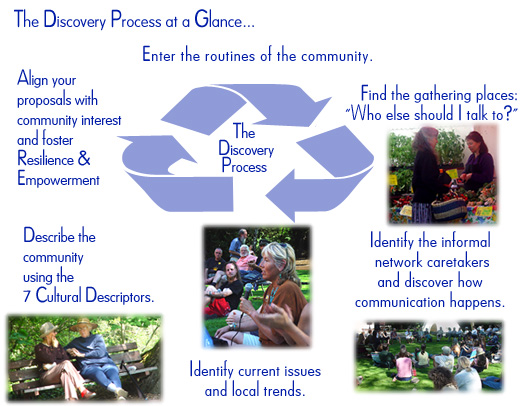
The key to implementing successful change is to understand the social and cultural structure within a community of place. The “inside point of view” becomes clear by entering everyday routines, making observations, and engaging in conversation with community members. This is called “The Discovery Process.” Since 1967 our company has worked with communities, corporations, and governments to implement “The Discovery Process.”
The objective of the Discovery Process is to get a real-time understanding of what is happening in a given place:
Creating Citizen Ownership
By entering a community through this network process we come to understand the core issues that are of concern to the people. Issues affect proposed projects, management decisions, and policy formation. By identifying these issues we can take appropriate actions early in the process that optimizes resource efficiency. This creates an environment amenable to preventing and resolving conflicts in a culturally sensitive manner. Residents often point out trends years before they show up in statistics.
Fostering Mutual Benefit
Issues that have been identified in their emerging stage can be integrated with management concerns to create “cultural alignment” in which mutual benefit for all parties is possible. Without this grounding in the informal system of community, projects can get bogged down or ambushed, often at the last minute, or held hostage by extreme interests. Even if the project is approved, the results are often disastrous to the local culture of the community. We take these factors into account early in the process and create an environment amenable to preventing and resolving conflicts in a culturally sensitive way.
Key skills to effective Discovery:
Describing: Describing is the ability to communicate what is seen in a community in a way that informs others without value judgments impairing the description. All observations should be written down for later reflection.
Reflecting: Reflecting is the ability to listen to the observations of another individual (describing the community) and refining the description from their responses without giving advise or answers based on other experiences, prejudices, etc.
Being a Stranger: Being a stranger is the ability to observe and interact in a community with a minimum of preconceived ideas and conclusions about that community. This is the most difficult technique in describing a community and the most difficult to accomplish.
Listening: People are willing to talk to others about their communities. The ability to actively listen to others will reveal an abundance of information. An active listener listens with their whole being and attempts not to form any response until the listening is finished.
Focusing: From the overall description, it is important to focus on the description to find the issues that relate to Washoe County.
Documenting: The description must be documented in a usable way. In Washoe County, the description is documented inside the Issue Tracking System, which is a part of the Washoe County Geographic Information System (GIS).

